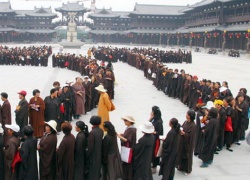Difference between revisions of "Nirvana or Nibbana The What And How By Jayaram V"
(Created page with "thumb|250px| <poem> Nirvana or nibbana is the final state of liberation a monk attains after spending years reflecting upon the Four Noble Truths and p...") |
m (Text replacement - "]]]" to "]])") |
||
| (8 intermediate revisions by 5 users not shown) | |||
| Line 1: | Line 1: | ||
[[File:Yongwujhs.jpg|thumb|250px|]] | [[File:Yongwujhs.jpg|thumb|250px|]] | ||
<poem> | <poem> | ||
| − | Nirvana or nibbana is the final state of liberation a monk attains after spending years reflecting upon the Four Noble Truths and practicing sincerely the Eightfold Path. When the monk attains this state after passing through the initial three paths, he or she beccomes completely free from all becoming. Nirvana or "nibbana" as it is popularly called, is liberation from the evils of impermanence, change and samsara and the dissolution of the transmigrating individual ego. | + | [[Nirvana]] or [[nibbana]] is the final state of [[liberation]] a [[monk]] attains after spending years {{Wiki|reflecting}} upon the [[Four Noble Truths]] and practicing sincerely the [[Eightfold Path]]. When the [[monk]] attains this state after passing through the initial three [[paths]], he or she beccomes completely free from all becoming. [[Nirvana]] or "[[nibbana]]" as it is popularly called, is [[liberation]] from the [[evils]] of [[impermanence]], change and [[samsara]] and the [[dissolution]] of the transmigrating {{Wiki|individual}} [[ego]]. |
| − | It is a condition where nothing actually happens, moves, changes or becomes. Is it a state of bliss. Well actually we do not know. because in that state there is no experience, no knowing and no knower and observer either. | + | It is a [[condition]] where [[nothing]] actually happens, moves, changes or becomes. Is it a state of [[bliss]]. Well actually we do not know. because in that state there is no [[experience]], no [[knowing]] and no knower and observer either. |
| − | When the Arhat or the holy one passes away, he attain the realm where there is nothing, "neither solid nor fluid, neither heat nor motion, neither this world nor any other world, neither the sun nor the moon." | + | When the [[Arhat]] or the [[holy one]] passes away, he attain the [[realm]] where there is [[nothing]], "neither solid nor fluid, neither heat nor {{Wiki|motion}}, neither this [[world]] nor any other [[world]], neither the {{Wiki|sun}} nor the [[moon]]." |
| − | This is called the cessation of becoming which is "neither arising, nor passing away, neither standing still nor being born, nor dying." It is Nirvana, which is unborn, without source, uncreated and unformed real into which escape is possible for the beings through cessation of craving. | + | This is called the [[cessation]] of becoming which is "neither [[arising]], nor passing away, neither [[standing]] still nor [[being]] born, nor dying." It is [[Nirvana]], which is {{Wiki|unborn}}, without source, uncreated and unformed real into which escape is possible for the [[beings]] through [[cessation]] of [[craving]]. |
| − | The Buddha did not encourage speculation by the initiates on the condition of Nirvana, because of the purely subjective nature of the experience. But an understanding of Nirvana was considered essential for the monks to continue their practice on the Eightfold path. | + | The [[Buddha]] did not encourage speculation by the initiates on the [[condition]] of [[Nirvana]], because of the purely [[subjective]] [[nature]] of the [[experience]]. But an [[understanding]] of [[Nirvana]] was considered [[essential]] for the [[monks]] to continue their practice on the Eightfold [[path]]. |
| − | What is actually the state of Nirvana? Is it a passing away into some void, into some nothingness, into some state that is without a center and without a boundary ? If it is liberation, passing away or dying out, then into what? What happens when a person attains Nirvana? Is Nirvana a kind of death from purely mental point of view? These are some of the difficult question we try to answer here. | + | What is actually the state of [[Nirvana]]? Is it a passing away into some [[void]], into some [[nothingness]], into some state that is without a center and without a boundary ? If it is [[liberation]], passing away or dying out, then into what? What happens when a [[person]] attains [[Nirvana]]? Is [[Nirvana]] a kind of [[death]] from purely [[mental]] point of [[view]]? These are some of the difficult question we try to answer here. |
| − | If we go by the sermon of flame delivered by the Buddha, Nirvana is the extinction of lust, of aversion, of delusion (raga, dvesha and moha), and of the urge to live. We are also told that when Nirvana is attained all becoming comes to an end. The notion of "I" and the "conceit of self-reference" disappears, since all notions of individuality have gone. | + | If we go by the {{Wiki|sermon}} of flame delivered by the [[Buddha]], [[Nirvana]] is the [[extinction]] of [[lust]], of [[aversion]], of [[delusion]] ([[raga]], [[dvesha]] and [[moha]]), and of the [[urge]] to [[live]]. We are also told that when [[Nirvana]] is [[attained]] all becoming comes to an end. The notion of "I" and the "[[conceit]] of self-reference" disappears, since all notions of {{Wiki|individuality}} have gone. |
| − | We are not sure whether Nirvana is a state of bliss or not, unlike in Hinduism where we are explicitly told that Self-realization leads to the experience of unbound bliss (Brhamananda). We are also not sure what happens when an Arhat who has attained Nirvana passes away. Does he continue to exists or cease to exist? The Buddha did not encourage any speculation on this and did not reveal anything about it, because in his opinion such knowledge in no way would contribute to the absence of passion, sorrow or attainment of Nirvana. | + | We are not sure whether [[Nirvana]] is a state of [[bliss]] or not, unlike in [[Hinduism]] where we are explicitly told that [[Self-realization]] leads to the [[experience]] of unbound [[bliss]] (Brhamananda). We are also not sure what happens when an [[Arhat]] who has [[attained]] [[Nirvana]] passes away. Does he continue to [[exists]] or cease to [[exist]]? The [[Buddha]] did not encourage any speculation on this and did not reveal anything about it, because in his opinion such [[knowledge]] in no way would contribute to the absence of [[passion]], [[sorrow]] or [[attainment]] of [[Nirvana]]. |
| − | Another question regarding Nirvana that is difficult to answer is whether an Arhat who has attained Nirvana would remain continuously in that state while he still remains in this world, or moves in and out of it from time to time. | + | Another question regarding [[Nirvana]] that is difficult to answer is whether an [[Arhat]] who has [[attained]] [[Nirvana]] would remain continuously in that state while he still remains in this [[world]], or moves in and out of it from [[time]] to [[time]]. |
| − | Available descriptions of the experience suggests that till the Arhats passes away from this world, Nirvana is probably not an uninterrupted experience and that probably there will still be some semblance of, or "mirage of individual existence existing in the minds of others, without a will to live." | + | Available descriptions of the [[experience]] suggests that till the [[Arhats]] passes away from this [[world]], [[Nirvana]] is probably not an uninterrupted [[experience]] and that probably there will still be some semblance of, or "{{Wiki|mirage}} of {{Wiki|individual}} [[existence]] [[existing]] in the [[minds]] of others, without a will to [[live]]." |
| − | We are also not sure, what happens when an Arhat leaves this world. Whether he continues to exist and if he exists at all in what manner he exists even the Buddha did not consider it fit to answer. | + | We are also not sure, what happens when an [[Arhat]] leaves this [[world]]. Whether he continues to [[exist]] and if he [[exists]] at all in what [[manner]] he [[exists]] even the [[Buddha]] did not consider it fit to answer. |
[[File:Xianhuayansi.jpg|thumb|250px|]] | [[File:Xianhuayansi.jpg|thumb|250px|]] | ||
| − | Probably in order to resolve this confusion, the followers of Mahayana Buddhism proposed the concept of Bodhisattvas deferring their salvation for the welfare of the people. These Bodhisattvas are beings of great merit who can attain Nirvana at will. But because of their unbound compassion, they sacrifice their own liberation and work for the liberation of others. The Buddhist pantheon grew out of this argument. | + | Probably in [[order]] to resolve this [[confusion]], the followers of [[Mahayana]] [[Buddhism]] proposed the {{Wiki|concept}} of [[Bodhisattvas]] deferring their {{Wiki|salvation}} for the {{Wiki|welfare}} of the [[people]]. These [[Bodhisattvas]] are [[beings]] of great [[merit]] who can attain [[Nirvana]] at will. But because of their unbound [[compassion]], they {{Wiki|sacrifice}} their own [[liberation]] and work for the [[liberation]] of others. The [[Buddhist]] {{Wiki|pantheon}} grew out of this argument. |
| − | "This is peace, this is exquisite — the resolution of all fabrications, the relinquishment of all acquisitions, the ending of craving; dispassion; cessation; Nibbana." — Anguttara Nikaya III.32 | + | "This is [[peace]], this is exquisite — the resolution of all [[fabrications]], the [[relinquishment]] of all acquisitions, the ending of [[craving]]; [[dispassion]]; [[cessation]]; [[Nibbana]]." — [[Anguttara Nikaya]] III.32 |
| − | There's no fire like passion, | + | There's no [[fire]] like [[passion]], |
| − | no loss like anger, | + | no loss like [[anger]], |
| − | no pain like the aggregates, | + | no [[pain]] like the [[aggregates]], |
| − | no ease other than peace. | + | no ease other than [[peace]]. |
| − | Hunger: the foremost illness. | + | Hunger: the foremost {{Wiki|illness}}. |
| − | Fabrications: the foremost pain. | + | [[Fabrications]]: the foremost [[pain]]. |
| − | For one knowing this truth | + | For one [[knowing]] this [[truth]] |
as it actually is, | as it actually is, | ||
Unbinding | Unbinding | ||
is the foremost ease. | is the foremost ease. | ||
| − | Freedom from illness: the foremost good fortune. | + | Freedom from {{Wiki|illness}}: the foremost good [[fortune]]. |
| − | Contentment: the foremost wealth. | + | [[Contentment]]: the foremost [[wealth]]. |
| − | Trust: the foremost kinship. | + | [[Trust]]: the foremost kinship. |
| − | Unbinding: the foremost ease. - Dhammapada 202-205 | + | Unbinding: the foremost ease. - [[Dhammapada]] 202-205 |
[[File:Wle2igs.jpg|thumb|250px|]] | [[File:Wle2igs.jpg|thumb|250px|]] | ||
| − | The enlightened, constantly | + | The [[enlightened]], constantly |
| − | absorbed in jhana, | + | absorbed in [[jhana]], |
persevering, | persevering, | ||
| − | firm in their effort: | + | firm in their [[effort]]: |
| − | they touch Unbinding, | + | they {{Wiki|touch}} Unbinding, |
the unexcelled safety | the unexcelled safety | ||
| − | from bondage. - Dhammapada 23 | + | from bondage. - [[Dhammapada]] 23 |
| − | "There is that dimension where there is neither earth, nor water, nor fire, nor wind; neither dimension of the infinitude of space, nor dimension of the infinitude of consciousness, nor dimension of nothingness, nor dimension of neither perception nor non-perception; neither this world, nor the next world, nor sun, nor moon. And there, I say, there is neither coming, nor going, nor stasis; neither passing away nor arising: without stance, without foundation, without support [mental object]. This, just this, is the end of stress." — Udana VIII.1 | + | "There is that [[dimension]] where there is neither [[earth]], nor [[water]], nor [[fire]], nor [[wind]]; neither [[dimension]] of the infinitude of [[space]], nor [[dimension]] of the infinitude of [[consciousness]], nor [[dimension]] of [[nothingness]], nor [[dimension]] of neither [[perception nor non-perception]]; neither this [[world]], nor the next [[world]], nor {{Wiki|sun}}, nor [[moon]]. And there, I say, there is neither coming, nor going, nor stasis; neither passing away nor [[arising]]: without stance, without foundation, without support ([[mental]] [[object]]). This, just this, is the end of [[stress]]." — [[Udana]] VIII.1 |
| − | "There is, monks, an unborn — unbecome — unmade — unfabricated. If there were not that unborn — unbecome — unmade — unfabricated, there would not be the case that emancipation from the born — become — made — fabricated would be discerned. But precisely because there is an unborn — unbecome — unmade — unfabricated, emancipation from the born — become — made — fabricated is discerned." — Udana VIII.3 | + | "There is, [[monks]], an {{Wiki|unborn}} — unbecome — unmade — unfabricated. If there were not that {{Wiki|unborn}} — unbecome — unmade — unfabricated, there would not be the case that [[emancipation]] from the born — become — made — [[fabricated]] would be discerned. But precisely because there is an {{Wiki|unborn}} — unbecome — unmade — unfabricated, [[emancipation]] from the born — become — made — [[fabricated]] is discerned." — [[Udana]] VIII.3 |
| − | Where water, earth, fire, & wind have no footing: | + | Where [[water]], [[earth]], [[fire]], & [[wind]] have no footing: |
| − | There the stars do not shine, | + | There the {{Wiki|stars}} do not shine, |
| − | the sun is not visible, | + | the {{Wiki|sun}} is not [[visible]], |
| − | the moon does not appear, | + | the [[moon]] does not appear, |
| − | darkness is not found. | + | {{Wiki|darkness}} is not found. |
| − | And when a sage, | + | And when a [[Wikipedia:Sage (sophos|sage]], |
| − | a brahman through sagacity, | + | a [[brahman]] through sagacity, |
has known [this] for himself, | has known [this] for himself, | ||
| − | then from form & formless, | + | then from [[form]] & [[formless]], |
| − | from bliss & pain, | + | from [[bliss]] & [[pain]], |
| − | he is freed. — Udana I.10 | + | he is freed. — [[Udana]] I.10 |
[[File:VR4.jpg|thumb|250px|]] | [[File:VR4.jpg|thumb|250px|]] | ||
| − | Then the Blessed One, picking up a little bit of dust with the tip of his fingernail, said to the monks, "What do you think, monks? Which is greater: the little bit of dust I have picked up with the tip of my fingernail, or the great earth?" | + | Then the [[Blessed One]], picking up a little bit of dust with the tip of his fingernail, said to the [[monks]], "What do you think, [[monks]]? Which is greater: the little bit of dust I have picked up with the tip of my fingernail, or the great [[earth]]?" |
| − | "The great earth is far greater, lord. The little bit of dust the Blessed One has picked up with the tip of his fingernail is next to nothing. It's not a hundredth, a thousandth, a one hundred-thousandth — this little bit of dust the Blessed One has picked up with the tip of his fingernail — when compared with the great earth." | + | "The great [[earth]] is far greater, [[lord]]. The little bit of dust the [[Blessed One]] has picked up with the tip of his fingernail is next to [[nothing]]. It's not a hundredth, a thousandth, a one hundred-thousandth — this little bit of dust the [[Blessed One]] has picked up with the tip of his fingernail — when compared with the great [[earth]]." |
[[File:Vilion.jpg|thumb|250px|]] | [[File:Vilion.jpg|thumb|250px|]] | ||
| − | "In the same way, monks, for a disciple of the noble ones who is consummate in view, an individual who has broken through [to stream-entry], the suffering & stress that is totally ended & extinguished is far greater. That which remains in the state of having at most seven remaining lifetimes is next to nothing: it's not a hundredth, a thousandth, a one hundred-thousandth, when compared with the previous mass of suffering. That's how great the benefit is of breaking through to the Dhamma, monks. That's how great the benefit is of obtaining the Dhamma eye." — Samyutta Nikaya XIII.1 | + | "In the same way, [[monks]], for a [[disciple]] of the [[noble ones]] who is [[consummate]] in [[view]], an {{Wiki|individual}} who has broken through [to [[stream-entry]]), the [[suffering]] & [[stress]] that is totally ended & [[extinguished]] is far greater. That which remains in the state of having at most seven remaining lifetimes is next to [[nothing]]: it's not a hundredth, a thousandth, a one hundred-thousandth, when compared with the previous {{Wiki|mass}} of [[suffering]]. That's how great the [[benefit]] is of breaking through to the [[Dhamma]], [[monks]]. That's how great the [[benefit]] is of obtaining the [[Dhamma]] [[eye]]." — [[Samyutta Nikaya]] XIII.1 |
| − | [Aggivessana Vacchagotta:] "But, Master Gotama, the monk whose mind is thus released: Where does he reappear?" | + | [Aggivessana [[Vacchagotta]]:] "But, [[Master]] [[Gotama]], the [[monk]] whose [[mind]] is thus released: Where does he reappear?" |
| − | [The Buddha:] "'Reappear,' Vaccha, doesn't apply." | + | [The [[Buddha]]:] "'Reappear,' [[Vaccha]], doesn't apply." |
| − | "In that case, Master Gotama, he does not reappear." | + | "In that case, [[Master]] [[Gotama]], he does not reappear." |
| − | "'Does not reappear,' Vaccha, doesn't apply." | + | "'Does not reappear,' [[Vaccha]], doesn't apply." |
"...both does & does not reappear." | "...both does & does not reappear." | ||
| Line 90: | Line 90: | ||
"...doesn't apply." | "...doesn't apply." | ||
| − | "How is it, Master Gotama, when Master Gotama is asked if the monk reappears... does not reappear... both does & does not reappear... neither does nor does not reappear, he says, '...doesn't apply' in each case. At this point, Master Gotama, I am befuddled; at this point, confused. The modicum of clarity coming to me from your earlier conversation is now obscured." | + | "How is it, [[Master]] [[Gotama]], when [[Master]] [[Gotama]] is asked if the [[monk]] reappears... does not reappear... both does & does not reappear... neither does nor does not reappear, he says, '...doesn't apply' in each case. At this point, [[Master]] [[Gotama]], I am befuddled; at this point, confused. The modicum of clarity coming to me from your earlier [[conversation]] is now obscured." |
[[File:Uan-zang-1.jpg|thumb|250px|]] | [[File:Uan-zang-1.jpg|thumb|250px|]] | ||
| − | "Of course you're befuddled, Vaccha. Of course you're confused. Deep, Vaccha, is this phenomenon, hard to see, hard to realize, tranquil, refined, beyond the scope of conjecture, subtle, to-be-experienced by the wise. For those with other views, other practices, other satisfactions, other aims, other teachers, it is difficult to know. That being the case, I will now put some questions to you. Answer as you see fit. What do you think, Vaccha: If a fire were burning in front of you, would you know that, 'This fire is burning in front of me'?" | + | "Of course you're befuddled, [[Vaccha]]. Of course you're confused. Deep, [[Vaccha]], is this [[phenomenon]], hard to see, hard to realize, [[tranquil]], refined, beyond the scope of conjecture, {{Wiki|subtle}}, to-be-experienced by the [[wise]]. For those with other [[views]], other practices, other satisfactions, other aims, other [[teachers]], it is difficult to know. That [[being]] the case, I will now put some questions to you. Answer as you see fit. What do you think, [[Vaccha]]: If a [[fire]] were burning in front of you, would you know that, 'This [[fire]] is burning in front of me'?" |
"...yes..." | "...yes..." | ||
| − | "And suppose someone were to ask you, Vaccha, 'This fire burning in front of you, dependent on what is it burning?' Thus asked, how would you reply?" | + | "And suppose someone were to ask you, [[Vaccha]], 'This [[fire]] burning in front of you, dependent on what is it burning?' Thus asked, how would you reply?" |
[[File:Timthu.jpg|thumb|250px|]] | [[File:Timthu.jpg|thumb|250px|]] | ||
| − | "...I would reply, 'This fire burning in front of me is burning dependent on grass & timber as its sustenance.'" | + | "...I would reply, 'This [[fire]] burning in front of me is burning dependent on grass & timber as its [[sustenance]].'" |
| − | "If the fire burning in front of you were to go out, would you know that, 'This fire burning in front of me has gone out'?" | + | "If the [[fire]] burning in front of you were to go out, would you know that, 'This [[fire]] burning in front of me has gone out'?" |
"...yes..." | "...yes..." | ||
| − | "And suppose someone were to ask you, 'This fire that has gone out in front of you, in which direction from here has it gone? East? West? North? Or south?' Thus asked, how would you reply?" | + | "And suppose someone were to ask you, 'This [[fire]] that has gone out in front of you, in which [[direction]] from here has it gone? [[East]]? [[West]]? [[North]]? Or [[south]]?' Thus asked, how would you reply?" |
| − | "That doesn't apply, Master Gotama. Any fire burning dependent on a sustenance of grass and timber, being unnourished — from having consumed that sustenance and not being offered any other — is classified simply as 'out' (unbound)." | + | "That doesn't apply, [[Master]] [[Gotama]]. Any [[fire]] burning dependent on a [[sustenance]] of grass and timber, [[being]] unnourished — from having consumed that [[sustenance]] and not [[being]] [[offered]] any other — is classified simply as 'out' (unbound)." |
| − | "Even so, Vaccha, any physical form by which one describing the Tathagata would describe him: That the Tathagata has abandoned, its root destroyed, like an uprooted palm tree, deprived of the conditions of existence, not destined for future arising. Freed from the classification of form, Vaccha, the Tathagata is deep, boundless, hard to fathom, like the sea. 'Reappears' doesn't apply. 'Does not reappear' doesn't apply. 'Both does & does not reappear' doesn't apply. 'Neither reappears nor does not reappear' doesn't apply. | + | "Even so, [[Vaccha]], any [[physical]] [[form]] by which one describing the [[Tathagata]] would describe him: That the [[Tathagata]] has abandoned, its [[root]] destroyed, like an uprooted palm [[tree]], deprived of the [[conditions]] of [[existence]], not destined for {{Wiki|future}} [[arising]]. Freed from the {{Wiki|classification}} of [[form]], [[Vaccha]], the [[Tathagata]] is deep, [[boundless]], [[hard to fathom]], like the sea. 'Reappears' doesn't apply. 'Does not reappear' doesn't apply. 'Both does & does not reappear' doesn't apply. 'Neither reappears nor does not reappear' doesn't apply. |
| − | "Any feeling... Any perception... Any mental fabrication... | + | "Any [[feeling]]... Any [[perception]]... Any [[mental]] [[fabrication]]... |
| − | "Any consciousness by which one describing the Tathagata would describe him: That the Tathagata has abandoned, its root destroyed, like an uprooted palm tree, deprived of the conditions of existence, not destined for future arising. Freed from the classification of consciousness, Vaccha, the Tathagata is deep, boundless, hard to fathom, like the sea." Majjhima Nikaya 72 | + | "Any [[consciousness]] by which one describing the [[Tathagata]] would describe him: That the [[Tathagata]] has abandoned, its [[root]] destroyed, like an uprooted palm [[tree]], deprived of the [[conditions]] of [[existence]], not destined for {{Wiki|future}} [[arising]]. Freed from the {{Wiki|classification}} of [[consciousness]], [[Vaccha]], the [[Tathagata]] is deep, [[boundless]], [[hard to fathom]], like the sea." [[Majjhima Nikaya]] 72 |
| − | "Birth is ended, the holy life fulfilled, the task done. There is nothing further for this world." — Samyutta Nikaya XXII.59 | + | "[[Birth]] is ended, the {{Wiki|holy}} [[life]] fulfilled, the task done. There is [[nothing]] further for this [[world]]." — [[Samyutta Nikaya]] XXII.59 |
| − | Some are born in the human womb, | + | Some are born in the [[human]] [[womb]], |
| − | evildoers in hell, | + | evildoers in [[hell]], |
those on the good course go | those on the good course go | ||
| − | to heaven, | + | to [[heaven]], |
while those without effluent: | while those without effluent: | ||
| − | totally unbound. — Dhammapada 126 | + | totally unbound. — [[Dhammapada]] 126 |
</poem> | </poem> | ||
{{R}} | {{R}} | ||
[http://www.hinduwebsite.com/buddhism/nirvana.asp /www.hinduwebsite.com] | [http://www.hinduwebsite.com/buddhism/nirvana.asp /www.hinduwebsite.com] | ||
[[Category:Nirvana]] | [[Category:Nirvana]] | ||
Latest revision as of 22:00, 4 April 2016
Nirvana or nibbana is the final state of liberation a monk attains after spending years reflecting upon the Four Noble Truths and practicing sincerely the Eightfold Path. When the monk attains this state after passing through the initial three paths, he or she beccomes completely free from all becoming. Nirvana or "nibbana" as it is popularly called, is liberation from the evils of impermanence, change and samsara and the dissolution of the transmigrating individual ego.
It is a condition where nothing actually happens, moves, changes or becomes. Is it a state of bliss. Well actually we do not know. because in that state there is no experience, no knowing and no knower and observer either.
When the Arhat or the holy one passes away, he attain the realm where there is nothing, "neither solid nor fluid, neither heat nor motion, neither this world nor any other world, neither the sun nor the moon."
This is called the cessation of becoming which is "neither arising, nor passing away, neither standing still nor being born, nor dying." It is Nirvana, which is unborn, without source, uncreated and unformed real into which escape is possible for the beings through cessation of craving.
The Buddha did not encourage speculation by the initiates on the condition of Nirvana, because of the purely subjective nature of the experience. But an understanding of Nirvana was considered essential for the monks to continue their practice on the Eightfold path.
What is actually the state of Nirvana? Is it a passing away into some void, into some nothingness, into some state that is without a center and without a boundary ? If it is liberation, passing away or dying out, then into what? What happens when a person attains Nirvana? Is Nirvana a kind of death from purely mental point of view? These are some of the difficult question we try to answer here.
If we go by the sermon of flame delivered by the Buddha, Nirvana is the extinction of lust, of aversion, of delusion (raga, dvesha and moha), and of the urge to live. We are also told that when Nirvana is attained all becoming comes to an end. The notion of "I" and the "conceit of self-reference" disappears, since all notions of individuality have gone.
We are not sure whether Nirvana is a state of bliss or not, unlike in Hinduism where we are explicitly told that Self-realization leads to the experience of unbound bliss (Brhamananda). We are also not sure what happens when an Arhat who has attained Nirvana passes away. Does he continue to exists or cease to exist? The Buddha did not encourage any speculation on this and did not reveal anything about it, because in his opinion such knowledge in no way would contribute to the absence of passion, sorrow or attainment of Nirvana.
Another question regarding Nirvana that is difficult to answer is whether an Arhat who has attained Nirvana would remain continuously in that state while he still remains in this world, or moves in and out of it from time to time.
Available descriptions of the experience suggests that till the Arhats passes away from this world, Nirvana is probably not an uninterrupted experience and that probably there will still be some semblance of, or "mirage of individual existence existing in the minds of others, without a will to live."
We are also not sure, what happens when an Arhat leaves this world. Whether he continues to exist and if he exists at all in what manner he exists even the Buddha did not consider it fit to answer.
Probably in order to resolve this confusion, the followers of Mahayana Buddhism proposed the concept of Bodhisattvas deferring their salvation for the welfare of the people. These Bodhisattvas are beings of great merit who can attain Nirvana at will. But because of their unbound compassion, they sacrifice their own liberation and work for the liberation of others. The Buddhist pantheon grew out of this argument.
"This is peace, this is exquisite — the resolution of all fabrications, the relinquishment of all acquisitions, the ending of craving; dispassion; cessation; Nibbana." — Anguttara Nikaya III.32
There's no fire like passion,
no loss like anger,
no pain like the aggregates,
no ease other than peace.
Hunger: the foremost illness.
Fabrications: the foremost pain.
For one knowing this truth
as it actually is,
Unbinding
is the foremost ease.
Freedom from illness: the foremost good fortune.
Contentment: the foremost wealth.
Trust: the foremost kinship.
Unbinding: the foremost ease. - Dhammapada 202-205
The enlightened, constantly
absorbed in jhana,
persevering,
firm in their effort:
they touch Unbinding,
the unexcelled safety
from bondage. - Dhammapada 23
"There is that dimension where there is neither earth, nor water, nor fire, nor wind; neither dimension of the infinitude of space, nor dimension of the infinitude of consciousness, nor dimension of nothingness, nor dimension of neither perception nor non-perception; neither this world, nor the next world, nor sun, nor moon. And there, I say, there is neither coming, nor going, nor stasis; neither passing away nor arising: without stance, without foundation, without support (mental object). This, just this, is the end of stress." — Udana VIII.1
"There is, monks, an unborn — unbecome — unmade — unfabricated. If there were not that unborn — unbecome — unmade — unfabricated, there would not be the case that emancipation from the born — become — made — fabricated would be discerned. But precisely because there is an unborn — unbecome — unmade — unfabricated, emancipation from the born — become — made — fabricated is discerned." — Udana VIII.3
Where water, earth, fire, & wind have no footing:
There the stars do not shine,
the sun is not visible,
the moon does not appear,
darkness is not found.
And when a sage,
a brahman through sagacity,
has known [this] for himself,
then from form & formless,
from bliss & pain,
he is freed. — Udana I.10
Then the Blessed One, picking up a little bit of dust with the tip of his fingernail, said to the monks, "What do you think, monks? Which is greater: the little bit of dust I have picked up with the tip of my fingernail, or the great earth?"
"The great earth is far greater, lord. The little bit of dust the Blessed One has picked up with the tip of his fingernail is next to nothing. It's not a hundredth, a thousandth, a one hundred-thousandth — this little bit of dust the Blessed One has picked up with the tip of his fingernail — when compared with the great earth."
"In the same way, monks, for a disciple of the noble ones who is consummate in view, an individual who has broken through [to stream-entry), the suffering & stress that is totally ended & extinguished is far greater. That which remains in the state of having at most seven remaining lifetimes is next to nothing: it's not a hundredth, a thousandth, a one hundred-thousandth, when compared with the previous mass of suffering. That's how great the benefit is of breaking through to the Dhamma, monks. That's how great the benefit is of obtaining the Dhamma eye." — Samyutta Nikaya XIII.1
[Aggivessana Vacchagotta:] "But, Master Gotama, the monk whose mind is thus released: Where does he reappear?"
[The Buddha:] "'Reappear,' Vaccha, doesn't apply."
"In that case, Master Gotama, he does not reappear."
"'Does not reappear,' Vaccha, doesn't apply."
"...both does & does not reappear."
"...doesn't apply."
"...neither does nor does not reappear."
"...doesn't apply."
"How is it, Master Gotama, when Master Gotama is asked if the monk reappears... does not reappear... both does & does not reappear... neither does nor does not reappear, he says, '...doesn't apply' in each case. At this point, Master Gotama, I am befuddled; at this point, confused. The modicum of clarity coming to me from your earlier conversation is now obscured."
"Of course you're befuddled, Vaccha. Of course you're confused. Deep, Vaccha, is this phenomenon, hard to see, hard to realize, tranquil, refined, beyond the scope of conjecture, subtle, to-be-experienced by the wise. For those with other views, other practices, other satisfactions, other aims, other teachers, it is difficult to know. That being the case, I will now put some questions to you. Answer as you see fit. What do you think, Vaccha: If a fire were burning in front of you, would you know that, 'This fire is burning in front of me'?"
"...yes..."
"And suppose someone were to ask you, Vaccha, 'This fire burning in front of you, dependent on what is it burning?' Thus asked, how would you reply?"
"...I would reply, 'This fire burning in front of me is burning dependent on grass & timber as its sustenance.'"
"If the fire burning in front of you were to go out, would you know that, 'This fire burning in front of me has gone out'?"
"...yes..."
"And suppose someone were to ask you, 'This fire that has gone out in front of you, in which direction from here has it gone? East? West? North? Or south?' Thus asked, how would you reply?"
"That doesn't apply, Master Gotama. Any fire burning dependent on a sustenance of grass and timber, being unnourished — from having consumed that sustenance and not being offered any other — is classified simply as 'out' (unbound)."
"Even so, Vaccha, any physical form by which one describing the Tathagata would describe him: That the Tathagata has abandoned, its root destroyed, like an uprooted palm tree, deprived of the conditions of existence, not destined for future arising. Freed from the classification of form, Vaccha, the Tathagata is deep, boundless, hard to fathom, like the sea. 'Reappears' doesn't apply. 'Does not reappear' doesn't apply. 'Both does & does not reappear' doesn't apply. 'Neither reappears nor does not reappear' doesn't apply.
"Any feeling... Any perception... Any mental fabrication...
"Any consciousness by which one describing the Tathagata would describe him: That the Tathagata has abandoned, its root destroyed, like an uprooted palm tree, deprived of the conditions of existence, not destined for future arising. Freed from the classification of consciousness, Vaccha, the Tathagata is deep, boundless, hard to fathom, like the sea." Majjhima Nikaya 72
"Birth is ended, the holy life fulfilled, the task done. There is nothing further for this world." — Samyutta Nikaya XXII.59
Some are born in the human womb,
evildoers in hell,
those on the good course go
to heaven,
while those without effluent:
totally unbound. — Dhammapada 126






